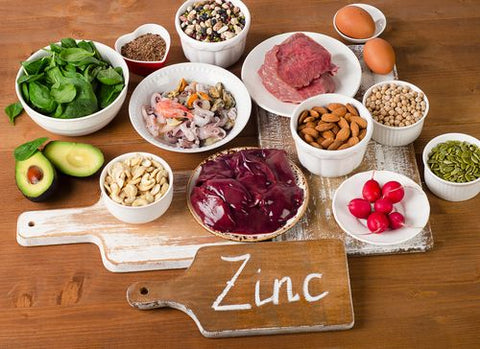Zinc is one of the many minerals and vitamins that the body needs to stay healthy, and this micronutrient is present in all the cells of the body. It contributes to growth and development, to maintaining healthy eyesight, to protecting the immune system and to helping the metabolism to function properly.
If you have a low zinc level, you are at risk for several conditions, including delayed growth (which is why this mineral is especially important for children), susceptibility to infections, and problems with healing wounds and injuries.
Your body should get enough zinc from a balanced diet and proper nutrients , but if you have a deficiency, there are supplements you can take.
Zinc: What is it?
Zinc is a trace metal that the body needs for many functions. It is the second most important mineral in the body after iron, but is not found in high levels. Other essential minerals include magnesium, calcium, and iodine. Some supplements contain a combination of these minerals.
Only a small amount of zinc is needed for enzymes in our body to create chemical reactions that keep us healthy, such as helping our body grow and develop . Our body does not produce zinc naturally, so we get it from the foods we eat.
Zinc oxide is also used externally (topically) for certain skin conditions such as eczema, burns, diaper rash, or sores . This product is essentially a breathable barrier cream that repels moisture and promotes healing. It is also used in some sunscreen creams for complete protection against harmful UV rays.

Zinc has been used for many years for skin protection , as its barrier properties make it suitable for people who have to wet their hands in water frequently, as part of a work activity.
Zinc: What is it used for?
Zinc can help in many of the body's functions:
-
Growth and development.
Wound healing.
Blood coagulation.
Thyroid function.
Immune function.
Taste and vision.
Reduction of inflammation.
Protein and DNA synthesis.
-
Cell protection.
Cholesterol reduction.
-
Prevention of diseases such as pneumonia and age-related macular degeneration (AMD).
Zinc has antioxidant properties, meaning it protects the body's cells from damage by free radicals . Free radicals are unstable molecules that can cause disease and aging. Antioxidants combat this process.
One of the benefits of zinc is that it is a popular treatment for cold symptoms and research has shown that taking zinc lozenges containing this mineral can reduce the duration of common colds.

The skin contains about 5% of the total zinc in the body. It is used for wound healing, as it helps collagen synthesis and fights inflammation. Collagen is essential for the repair of damaged tissues . That is why hospitals often use zinc to treat burns and serious wounds.
Zinc may also help manage type 2 diabetes , as it can help increase glucose levels and support blood sugar control. There is evidence that genetic makeup may influence how well zinc helps manage diabetes. Some people's bodies react differently to it than others. Also, people with diabetes tend to have more zinc in their urine than in their blood, which increases their risk of developing the disease.
If you suffer from acne, it may be because you have low levels of zinc . This skin condition is common in teenagers, but it can affect other people. Oil-producing glands, especially those on the face and back, become clogged and inflamed. A zinc supplement can help reduce this inflammation and prevent the growth of bacteria that cause acne spots.
Excessive alcohol consumption can interfere with proper zinc absorption , and some research has shown that liver disease in alcoholics may be associated with a lack of this essential mineral.
A zinc deficiency presents with several different symptoms and in the case of men, a zinc deficiency can cause erectile dysfunction.
It is not easy to detect zinc deficiencies with a simple blood test, since the amounts in the body are very small. If a doctor suspects that you do not have enough zinc in your body, he or she may perform a urine, blood plasma or even hair test.

Zinc: in which foods is it found?
If you eat a varied diet on a daily basis, you are likely to get enough zinc. Food sources with the highest concentration of zinc include:
Red meat such as beef.
Chicken.
-
Pork.
Lamb.
Shellfish such as oysters.
Dairy products, including milk and especially cheese.
Legumes such as lentils, beans, peas, chickpeas, etc.
Nuts and seeds.
-
Whole grains such as brown rice, bulgur, corn, oats, rye, spelt, wild rice, wheat germ, etc. and some foods such as breakfast cereals, bars and flour are already enriched.
Fruits and vegetables are not the main sources of zinc , so if you are vegetarian or vegan you will need to review your zinc intake and consider using a supplement .

Are you getting enough Zinc?
In Spain, most people consume enough zinc through food, however, some groups of people may have difficulty consuming enough zinc:
Those who have had surgery on the digestive tract , such as weight-loss surgery, or those who have gastrointestinal disorders, such as ulcerative colitis or Crohn's disease. These conditions decrease the body's ability to absorb zinc and increase the amount excreted in urine.
Vegetarians or vegans , because they do not eat meat, which is a good source of zinc. In addition, some legumes and cereals contain phytates that reduce the amount of zinc that the body absorbs.
Pregnant or breastfeeding mothers , since they need more zinc for the baby's development and to produce milk.
Babies from 6 months of age , because breast milk no longer provides them with sufficient amounts of zinc. Babies from six months of age onwards should eat foods containing zinc, for example, meat purees.
Children with sickle cell disease because the medications they take may reduce zinc levels.
People who have an alcohol use disorder , since alcohol reduces the amount of zinc the body absorbs and increases the amount eliminated in the urine.

Zinc: how to take it?
The average daily dose of zinc that adults need to stay healthy is 9.5 mg for men and 7 mg for women.
Pregnant women should consult their doctor about their zinc levels, as they may need a higher dose than recommended to support the development of the baby. This also applies to women who are breastfeeding.
Most multivitamin supplements contain zinc, which is an alternative to taking a pure zinc supplement.





Comments (0)
There are no comments for this article. Be the first one to leave a message!